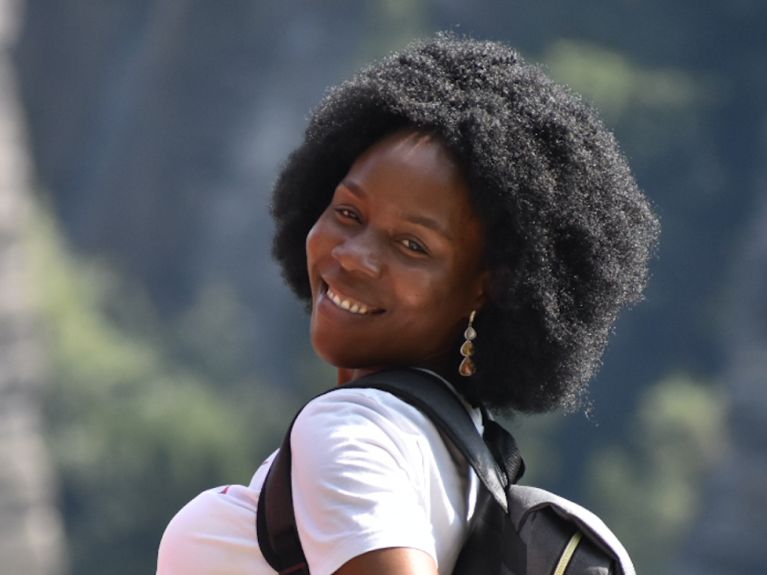“Telling our own stories”
The film scholar Ezinne Ezepue wants to promote a more nuanced image of Africa and in her work in Cologne is researching how folktales might help achieve this.

On a two-year Georg Forster Research Fellowship awarded to researchers from developing and emerging countries by the Alexander von Humboldt Foundation, the Nigerian film scholar Ezinne Ezepue has been working at the Internationale Filmschule Köln since August 2022. In her research there, she explores how folktales can enrich African films. She talks about the potential of folktales, what inspires her and how she pursues her work in Germany.
Dr Ezepue, you want your research to promote a more nuanced image of Africa worldwide. What can films do to help achieve this?
It bothers me that the image of Africa is mostly negative and stereotypical. It’s almost always the same: Hunger, poverty, war, ethnic rivalries, religious clashes. These things are true. But the representation is unbalanced. I forgive the media, as for them bad news is good news. But even many films set in Africa, such as the Disney film “Queen of Katwe”, only show negative things. Is that really all the camera sees? We should not deny the positive, which also exists. I ask myself: How can we Africans tell our own stories? How do we talk about the negative? What other aspects do we have and how do we get others to see them?
How can we Africans tell our own stories?
Why do you see African folktales as having potential?
I grew up in a village and my grandparents always told us stories. But more and more people are migrating to the cities and no longer have the time to sit by the fire and listen. We have to think about how we can preserve these stories. I teach at the University of Nigeria and founded the “Africa on Script” initiative, where students write stories about Africa. With the help of folktales, we can also teach them storytelling skills. There is a lot of inspiration in these stories. The Nigerian film industry, which is the biggest in Africa, is growing and needs many stories. And most importantly: We are taking charge of our narratives.

Can you recommend any African films that are already based on such folktales?
There are more and more of them. Netflix and UNESCO launched a short film competition in 2021. I loved the resulting anthology “African Folktales Reimagined”. The Nigerian film “Mami Wata” by C. J. Obasi, which was shown at the Sundance Festival in 2023, is trending at the moment. Mami Wata is a water goddess. It could be called a folktale, but she is more a part of the spirituality in several countries in West Africa. I like it when filmmakers do not just make something up, but take inspiration from existing stories that define the people of Africa. Be it fictional stories like folktales, legends and mythology or stories from real life. It tells the world more about us.
Germany offers needed support and inspiration.
To what extent does your time in Germany help you in your work?
I had never really thought about Germany before the fellowship. But because I had already been to the UK for my Master’s and my PhD, I thought it was time for a change. The fellowship suits very well, it supports projects that are relevant to the development of the fellowship holders’ countries. My host professor in Cologne, Joachim Friedmann, is an expert in serial storytelling. His course interrogates the social responsibility of filmmakers. Germany offers needed support and inspiration.
Can you give an example of a film that fulfils its social responsibility?
“The Boy Who Harnessed the Wind” by Chiwetel Ejiofor about a boy from Malawi who tries to solve the drought problem in his community. It shows that despite everything you go through, you can still try to make a difference. However, the film was financed with money from the West. And how many boys and girls actually saw it? One problem in Africa is distribution. We make great films, but we do not get to see them.
Dieses YouTube-Video kann in einem neuen Tab abgespielt werden
YouTube öffnenThird party content
We use YouTube to embed content that may collect data about your activity. Please review the details and accept the service to see this content.
Open consent formWhat form does your research in Germany take?
My project is called “Reimagining African Folktales”, but my research can be used in any part of the world where folklore exists. It’s a search for the rudiments of storytelling. I did my PhD on the film industry in Nigeria. At that time, I found that our films did not raise curiosity to learn more about the country. The film industry was booming then, but there is a need to rethink storytelling as well. I realised that I could make a difference because at university I was teaching the filmmakers of tomorrow. I now want to develop a toolkit for adapting folktales into contemporary films for my students in Nigeria. I would also like to present my findings to scriptwriters. We need to do more than just entertain.
I now want to develop a toolkit for adapting folktales into contemporary films for my students in Nigeria.
Could you imagine making a film yourself one day?
Yes, I am interested in documentaries or reality shows. I would also like to start a serial narrative on campus in Nigeria for my students to practise and develop.



